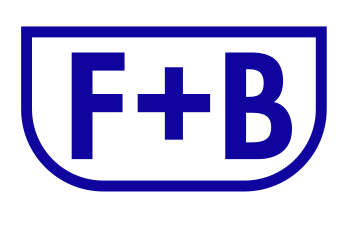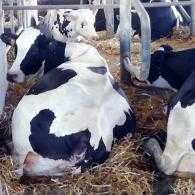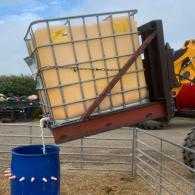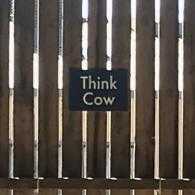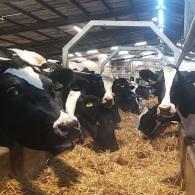Baldini’s farm in northern Italy specialises in breeding and raw milk production. With approx. 650 head of cattle, the business is run by 6 family members and 3 additional staff. Cultivating 150ha for feeding the herd, this is made up of 50 ha of forage alfalfa, 50ha of silage maize and 50ha of herbaceous forage crops.
Over the last 10 years, the company has invested heavily in technological tools and mechanization, with the help of machinery and equipment to minimize the manual intervention of man, reduce environmental impact and improve livestock welfare.
A new herd monitoring system, directly linked to smartphones, provides data on feeding, rest time, rumination, and reproductive cycles, enabling the family to identify any potential health problems within the herd. Cows are also weighed several times a day in order to monitor any weight loss that is symptomatic of poor health.
Seven milking robots assist the well-being and health of each individual cow due to the multiple checks each day – cows are milked 3 times/day on average on a voluntary basis. This way, they are more relaxed, healthier and produce more milk, and it also allows staff more time to give the animals real attention, paying attention to udder health. All information gathered by the robots is sent to the integrated herd management system on the robot management PC, as well as staff smartphones.
Shed and floor cleaning is taken care of by automatic hydraulic scrapers that systematically transport the manure towards the waste collection tanks. During resting periods, cows have their own cubicle, littered with compost separated from the slurry. The screw press separator to sort the solids from liquids effectively separates fresh liquid manure, preventing the fermentation process, and producing bacterially stable, warm, soft green bedding. It has a high percentage of short fibre, enabling it to absorb more moisture, resulting in cleaner animals, reduced aroma, and less slippery floors and aisles, also reducing lameness risks. The soft texture is also healthier for the cows’ teats, reducing mastitis cases. The farm no longer has to buy in straw or sawdust, and there is less dust in the sheds.
For calves, a modern feeding station allows frequent feeding, gradually decreasing the milk supply to zero. This encourages healthy growth, optimal hygiene, and saves labour. The feeding station also has a fully automated cleaning process of the suction tube and teat circuit, and is equipped with a management program, providing information and data on the health of the calves.
For the arable side of the business, minimum tillage is adopted across the farm, providing a significant saving in inputs and time spent on the land, while also reducing CO2 emissions and improving soil health. An agro-meteorological shed for monitoring agricultural crops, and powered by solar panels, is equipped with an anemometer to monitor wind speed and pressure, and a wind vane, also measuring atmospheric pressure, rainfall, leaf wetness, dew point, heat index and cooling index, soil temperature and moisture, air temperature and humidity, and UV. This allows the team to plan crop treatments in advance, making savings on irrigation and fuel.



